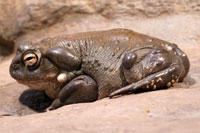Poisonous Toads and Your Dog

Dogs, who are very inquisitive by nature, will often come across toads and frogs when out playing or walking with you, particularly in the warmer months of the year.
While it is great fun to watch them sniff out and chase toads, it can be a very dangerous game indeed—and not only for the toads!
In the southwestern United States, Northern Mexico, Central Mexico, and South America (arid and semi-arid areas) lives a large toad alternately known as the Colorado River Toad, Sonoran Desert Toad, and Cane Toad (Bufo alvarius).
The Colorado River Toad is large, plump, olive brown or grey on top, and very light colored underneath. They may have dark spots on their body and usually have warts.
This toad is most often found in small springs, streams, rivers, and pools of water that form after a rain, particularly after a desert monsoon rain.
The toad’s skin is covered by toxins that may not only be harmful to your dog's health, but may easily be fatal if your dog should “mouth” the toad. The poison is very quickly absorbed by the mucous membranes in the mouth.
Symptoms of toad poisoning are numerous and may include:
- drooling
- slobbering foam
- head shaking
- tearing of the eyes
- loss of coordination
- apparent blindness
- bright red gums
- elevated heartbeat
- dilated pupils
- high fever
- seizures
If any or several of these symptoms are observed, flush the mouth out carefully with a large amount of water. Use a hose, a shower sprayer, or a kitchen sink sprayer on a low velocity and be sure to direct the stream in order wash the toxins out of the mouth . . . and not down into the throat.
Bring your pet to a veterinarian immediately, as even low doses of the toad’s poison may be fatal without proper treatment.
There is no antidote to this toxin. However, with prompt supportive care such as cool water, intravenous fluids, anti-arrhythmic drugs, sedation, and atropine, your dog has a good chance of survival.
Disclaimer: This website is not intended to replace professional consultation, diagnosis, or treatment by a licensed veterinarian. If you require any veterinary related advice, contact your veterinarian promptly. Information at DogHealth.com is exclusively of a general reference nature. Do not disregard veterinary advice or delay treatment as a result of accessing information at this site. Just Answer is an external service not affiliated with DogHealth.com.
Notice: Ask-a-Vet is an affiliated service for those who wish to speak with a veterinary professional about their pet's specific condition. Initially, a bot will ask questions to determine the general nature of your concern. Then, you will be transferred to a human. There is a charge for the service if you choose to connect to a veterinarian. Ask-a-Vet is not manned by the staff or owners of DogHealth.com, and the advice given should not delay or replace a visit to your veterinarian.


